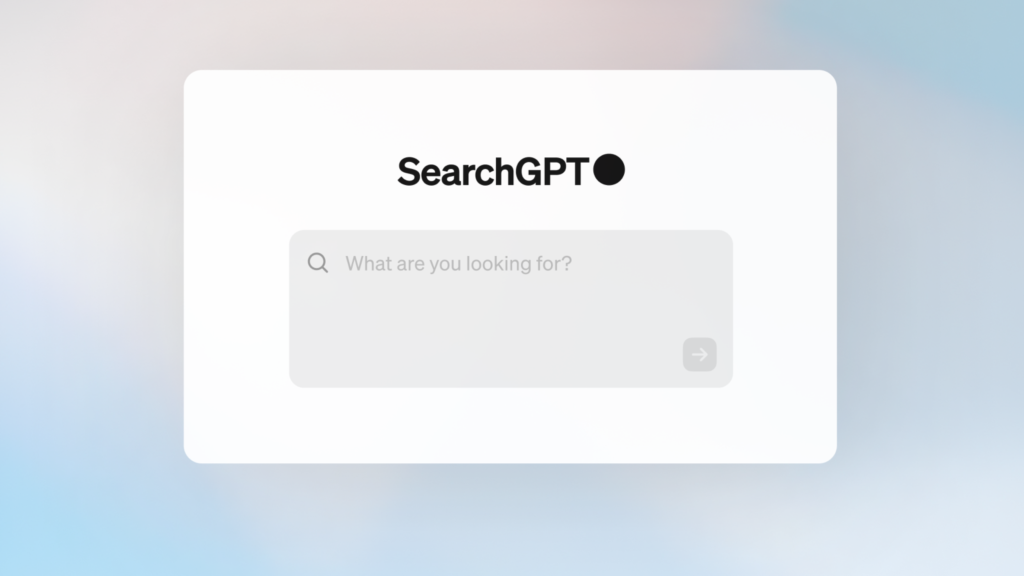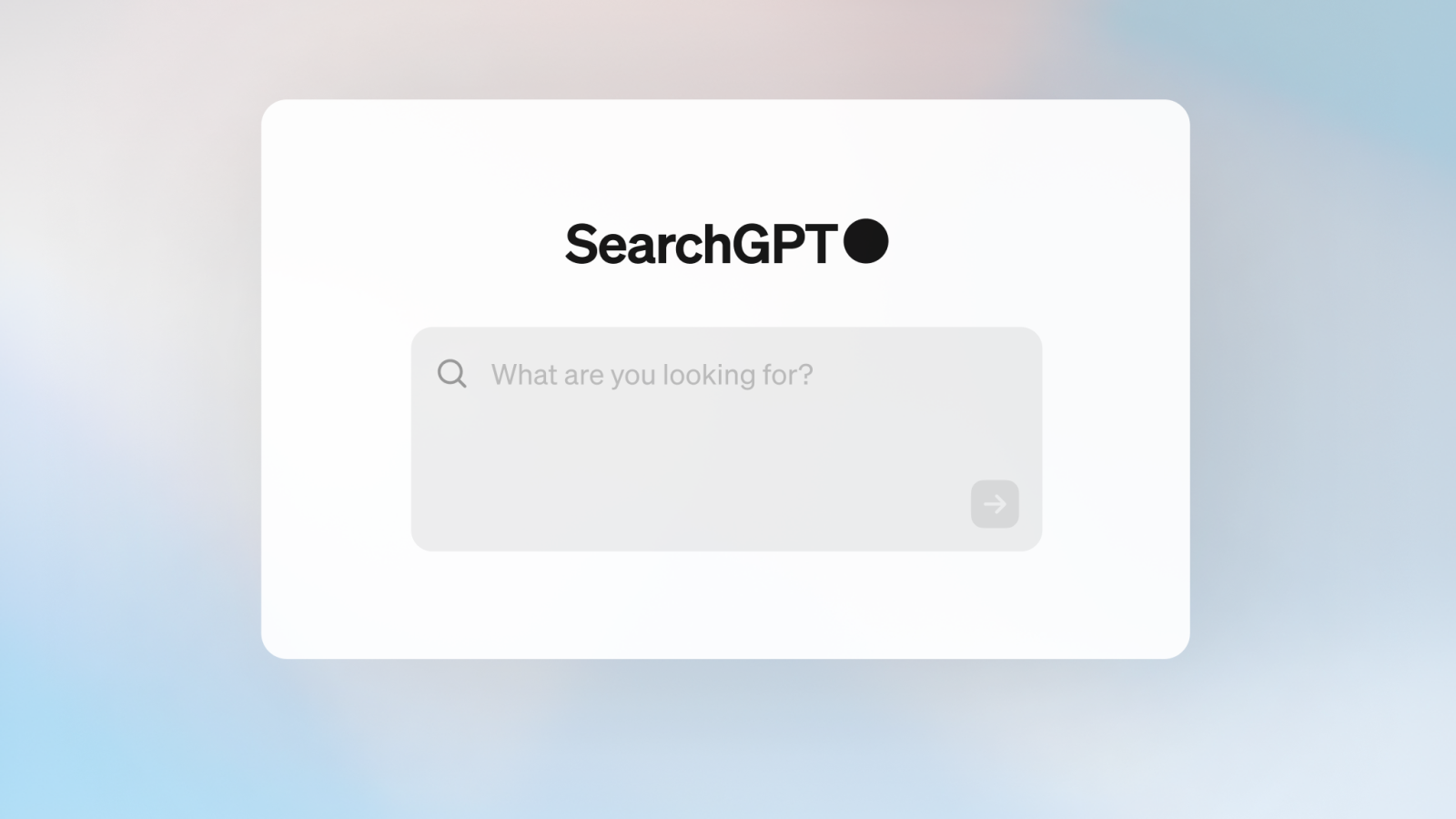Updated July 29th, 2024: New of the impact of OpenAI’s Search GPT on SEO and stock market reactions. Learn how this new generative ai search engine prototype could reshape digital search, crush Google, and some early optimization theories to consider.
OpenAI’s SearchGPT Prototype Announcement Sparks Stock Market Chaos, Leaving Google Scrambling
OpenAI’s recent announcement, Search GPT, has stirred up a whirlwind of reactions from industry insiders and casual internet users alike. Unlike its predecessor, ChatGPT, which primarily functions as a conversational agent, Search GPT aims to change the way we interact with search engines. As a direct alternative to Google, it promises to deliver timely and relevant information without the encumbrance of ads and the need to sift through numerous web pages. This novel approach is causing ripples not just in the SEO community but across the broader market landscape.
In this article, we will explore the various ways Search GPT may impact SEO for good, the surprising responses from the stock market, a leaked look at its user interface it offers, and theoretical strategies required to prepare for this new search engine.
What We Know About Sam Altman’s “SearchGPT” Prototype
Search GPT is the latest prototype from OpenAI, thrust into the limelight as a formidable alternative to Google. Launched recently, this novel search engine allows users to input queries and receive results that are coupled with relevant sources for easy reference. Unlike the traditional search engines, which often inundate users with ads and a deluge of blue links, Search GPT promises a more streamlined and ad-free user experience. This innovation addresses a common complaint among users who are weary of wading through endless advertisements just to find the information they seek.
The inception of Search GPT marks a significant departure from ChatGPT, which is more conversational in nature. In contrast, Search GPT operates with the intent of delivering quick, precise answers by sifting through vast amounts of data. This not only sets a new standard for user satisfaction but also prompts a re-evaluation of current SEO strategies. As digital searches become more sophisticated and user-centric, the SEO community must adapt to these evolving dynamics in order to maintain relevance and efficacy.
The Potential Impact on SEO Practices and The Shift to GEO
The arrival of Search GPT brings with it a wave of apprehension and intrigue within the SEO community. Historically, SEO has always been tied to the algorithms and guidelines set forth by dominant search engines like Google. With the advent of Search GPT, there is potential for a paradigm shift. The main question on everyone’s mind is, how will SEO evolve to stay effective in this new environment?
First and foremost, content remains king. The core principle that high-quality, relevant content is fundamental to search visibility has not changed. However, the way content is evaluated and ranked might see significant changes. Search GPT’s focus on providing authoritative sources means that SEO professionals will need to place an even greater emphasis on creating content that is not only informative but also authoritative. Brands will need to establish themselves as leaders in their respective fields through meticulous research and credible citations.
Furthermore, backlinks and authority will play an increasingly vital role. As Search GPT values the credibility of sources, websites that consistently produce reputable content and receive backlinks from other authoritative sites will likely fare better. This implies a shift towards a more rigorous vetting process for link-building strategies. SEO professionals will need to be more discerning in their approach, placing a premium on quality over quantity when it comes to backlinks.
Market Reacts as Google’s stock tumbles after SearchGPT announcement
The introduction of Search GPT has not gone unnoticed in the financial markets. Following the announcement, there was a notable decline in Alphabet’s stock price, signaling investor concerns over Google’s ability to maintain its dominance in the face of this new competitor. However, it is essential not to jump to hasty conclusions about Google’s future. Historical precedence, such as the initial response to ChatGPT, shows that Google has a resilient track record of adapting to technological advancements.
Analysts suggest that while Search GPT presents a formidable challenge, it is unlikely to render Google obsolete. Instead, it will push Google to innovate further, possibly leading to enhancements in their existing services or the introduction of new features. The competitive landscape of digital search is poised to become more dynamic, driving continuous improvement and potentially benefiting end-users with better, more diverse search options.
Moreover, the market reaction extends beyond stock prices. Businesses that rely heavily on SEO for visibility and customer acquisition are also closely monitoring the situation. There is a growing curiosity about how Search GPT’s algorithms will influence search results and what adjustments will be necessary to maintain online prominence. The ripple effect of Search GPT’s launch is prompting organizations to revisit their digital marketing strategies, preparing for a possible shift in how search engines evaluate and rank content.
Search GPT User Interface (what we know so far)
One of the most striking aspects of Search GPT is its user interface. Unlike traditional search engines that present results predominantly as a list of blue links, Search GPT offers a more dynamic and visually engaging display. This prototype aims to enhance the user experience by presenting information in various formats, including images, summaries, and direct links to authoritative sources.
The departure from conventional search engine designs reflects a broader trend towards intuitive and user-centric interfaces. Users can expect a more seamless navigation experience, as Search GPT endeavors to present answers in a structured, easily digestible manner. This approach not only saves time but also reduces the cognitive load associated with sifting through multiple search results. The implications for SEO are significant, as the presentation of search results will directly impact user engagement and click-through rates.
For those eager to explore Search GPT firsthand, the process of obtaining early access is relatively straightforward. Interested users can join the waitlist on OpenAI’s website, allowing them to experience the platform’s capabilities and provide feedback on its functionality. Early adopters will play a crucial role in shaping the future of SearchGPT by contributing user insights that can refine its performance and usability.

Adapting from SEO Strategies to GEO for Search-GPT
As Search GPT becomes more integrated into the digital ecosystem, SEO professionals will need to adapt their strategies to align with its unique algorithms and paradigms. While the fundamental principles of SEO—such as producing high-quality content and building credible backlinks—remain essential, there are several specific adjustments that need to be considered.
Firstly, there will be an increased focus on the credibility of sources. Search-GPT prioritizes providing information from authoritative and trustworthy sources. Therefore, it is crucial for SEO practitioners to emphasize the credibility and accuracy of the content they produce. Incorporating corroborative references, adhering to high editorial standards, and maintaining a robust presence on reputable platforms will be key to achieving better rankings.
Secondly, the multidimensional display of search results necessitates a broader approach to content creation. SEO will no longer be solely about optimizing text-based content. Integrating various media formats—such as images, videos, and infographics—will become more important, as these elements contribute to the overall user experience. This holistic approach to content creation will require SEO professionals to be versatile and innovative in their strategies.
Additionally, user experience (UX) will take center stage. The streamlined and intuitive interface of Search GPT underscores the importance of providing an excellent user experience. Websites that are easy to navigate, mobile-friendly, and quick to load will likely perform better in search rankings. SEO strategies must, therefore, incorporate UX principles to ensure that websites meet the expectations of Search GPT’s discerning algorithms.
Opportunities and Challenges in the New Search Paradigm
The introduction of Search GPT presents both opportunities and challenges for those involved in digital search and SEO. On the one hand, the disruption brought about by new technologies opens up opportunities for innovation. Early adopters who can quickly adapt to the changing landscape will have the chance to gain a competitive edge. By embracing new ways of content creation and optimization, businesses can position themselves as pioneers in the evolving search ecosystem.
On the other hand, the transition to a new search paradigm comes with its own set of challenges. Established SEO practices that have been honed over the years may need to be re-evaluated and adjusted. This transition requires a willingness to learn and experiment with new techniques, as well as an openness to feedback and continuous improvement. The evolving nature of Search GPT’s algorithms means that SEO professionals must stay agile and informed, staying ahead of the curve to maintain their relevance and effectiveness.
Moreover, the emphasis on authority and credibility necessitates a more proactive approach to content strategy. Businesses will need to invest in thorough research, high-quality writing, and meticulous editing to ensure that their content meets the new standards of search engines. This may also require collaboration with subject matter experts and a focus on building a robust network of reputable backlinks.
In conclusion, GPT-Search represents a significant shift in the digital search landscape. Its impact on SEO practices, market reactions, user interfaces, and content strategies cannot be understated. While the transition presents challenges, it also offers exciting opportunities for innovation and growth. By staying informed, adaptable, and committed to producing valuable and authoritative content, businesses and SEO professionals can navigate this new terrain and thrive in the evolving search ecosystem.
Cutting-Edge Tech Startup Ideas: AI-Powered Virtual Personal Stylist, Drone Delivery Service, Sustainable Food Packaging
The fashion industry has long been characterized by its fast-paced nature and ever-changing trends, making…
Top Free Guest Posting Sites for Boosting Your Content
Guest posting, also known as guest blogging, is a strategic practice in the digital marketing…
Top UK YouTube Gaming Influencers
In recent years, the landscape of entertainment has undergone a seismic shift, with YouTube emerging…
Top YouTube Influencers in the Philippines
In recent years, the Philippines has emerged as a vibrant hub for YouTube influencers, showcasing…
The Top YouTube Influencers of 2021
In the digital age, YouTube has emerged as a powerful platform that transcends traditional media,…
Top Keto Influencers on YouTube
The ketogenic diet, commonly known as the keto diet, has gained immense popularity in recent…







